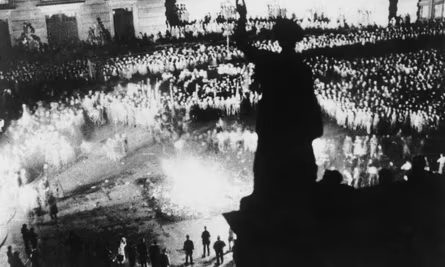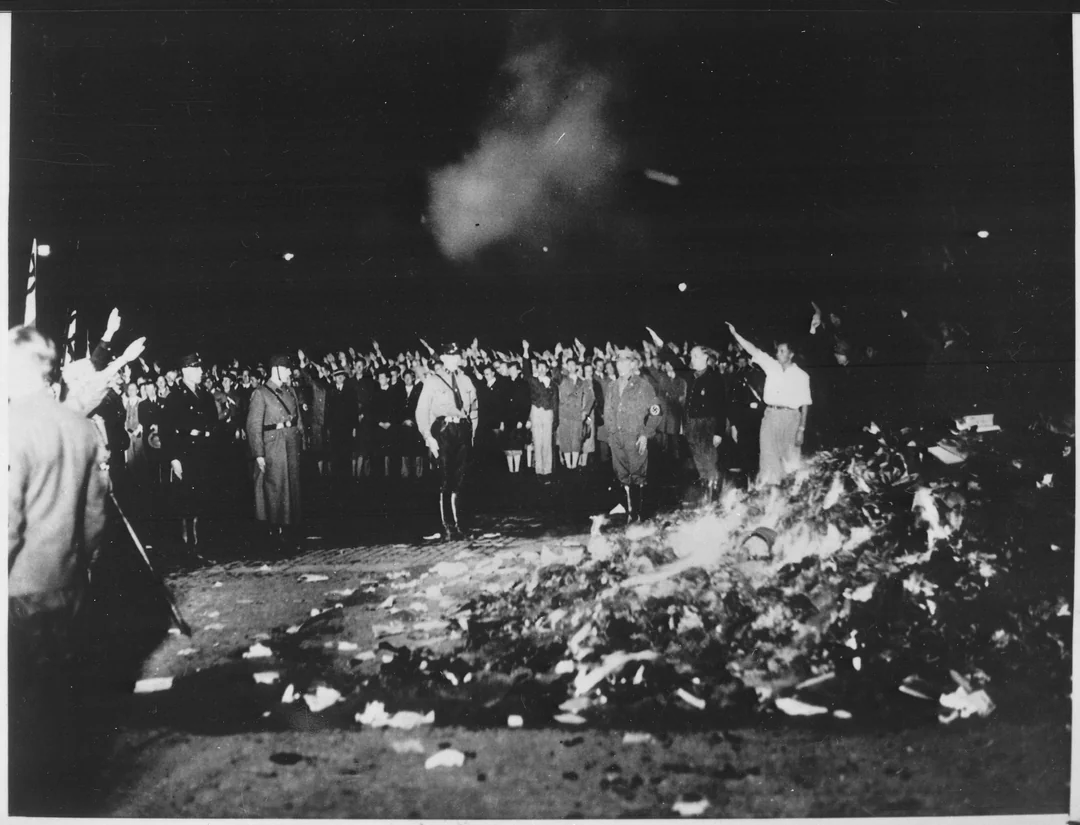From Nazi Germany to the Pinochet regime in Chile, the burning of books has been a potent symbol of authoritarian control, cultural repression, and the systematic elimination of dissent. While the act of burning books might seem extreme, it is a deliberate and strategic move by fascist regimes to consolidate power and eliminate any threats to their ideological dominance. Understanding why fascists burn books can help us recognize the warning signs of creeping authoritarianism, especially when we look at current trends in book banning and educational censorship around the world.
The Power of Ideas
At the core of book burning is a fear of ideas. Fascist regimes understand that controlling the narrative is essential to maintaining power. Ideas have the power to challenge the status quo, inspire resistance, and sow the seeds of revolution. As historian Carter Woodson wrote, “If you can control a man’s thinking, you do not have to worry about his actions.” By silencing intellectuals, educators, and writers, fascists aim to suppress dissent and ensure that only the approved narrative prevails.
Book burning is not just about eliminating specific works; it’s about erasing the diversity of thought that challenges the regime’s vision of the world. In Nazi Germany, for example, the infamous book burnings of May 10, 1933, targeted authors who were seen as “un-German”—Jewish writers, communists, socialists, and intellectuals who criticized the regime. Among the books thrown into the flames were works by Karl Marx, Bertolt Brecht, and Thomas Mann—writers whose ideas threatened the Nazi vision of a racially “pure” and ideologically homogenous society.
The Nazis knew that an educated and critically thinking population was a danger to their rule. So, they attacked not just the books, but the institutions of higher learning itself, purging universities of professors deemed “politically unreliable” and silencing anyone who opposed the regime’s ideology. This coordinated campaign of censorship was not only an attempt to control the present but also to rewrite history in a way that suited the fascist narrative.


The Global Pattern: From Germany to Chile
The lessons from Nazi Germany are not confined to the past. In Chile, following the 1973 coup led by General Augusto Pinochet, a similar assault on education took place. The military regime seized control of schools and universities, purging educators and students deemed sympathetic to the leftist government of President Salvador Allende. Political science, sociology, and other disciplines that encouraged critical thinking were eliminated from the curriculum in favor of vocational and business courses that would produce a compliant, apolitical workforce.
In both cases, the fascist regimes understood that education and access to knowledge are powerful tools for shaping a society’s values and political orientation. By controlling education and censoring literature, they sought to produce a generation of people who would accept the status quo and refrain from challenging the regime’s authority.
This historical pattern is increasingly relevant today. Across the globe, there has been a rise in book banning and educational censorship that mirrors the tactics used by authoritarian regimes in the 20th century. In the United States, for example, over the past few years, more than 1,600 books have been banned from school libraries, with a focus on works that explore race, gender, LGBTQ issues, and the history of oppression. In many states, including Florida and Texas, lawmakers have introduced bills to restrict the teaching of critical race theory and limit discussions around race and gender in the classroom.
The parallels with past fascist regimes are hard to ignore. Just as the Nazis burned books to suppress ideas that threatened their vision of an “Aryan” society, today’s book bans are often justified by claims of protecting children from “inappropriate” content. Yet, behind these justifications lies the same desire to control the flow of information and eliminate any ideas that could challenge the political status quo.
Book Banning in the U.S.: A Modern-Day Paradox
In the United States, book banning has escalated in recent years, particularly in the wake of growing movements advocating for racial justice and LGBTQ rights. In states like Florida, Republican lawmakers, under the leadership of Governor Ron DeSantis, have spearheaded efforts to censor education, removing books from school libraries and classrooms that deal with issues of race, sexuality, and social justice.
One of the most high-profile examples occurred in Tennessee, where the graphic novel Maus—a Pulitzer Prize-winning book about the Holocaust—was banned from school libraries. In Florida, the state passed laws that require educators to offer “opposing” viewpoints on subjects like the Holocaust, creating a climate where teachers are increasingly fearful of teaching anything that could be considered politically controversial. The chilling rhetoric surrounding these actions echoes the language of fascist regimes, where educators and intellectuals are framed as threats to national unity and are punished for teaching ideas deemed subversive.
As we saw in Nazi Germany and Pinochet’s Chile, the attack on education and the banning of books is not just about controlling the present—it’s about shaping the future. By preventing students from learning about the struggles for racial justice, gender equality, and human rights, these movements aim to create a generation that accepts the dominant narrative without question, much like the fascist regimes of the past.
Why Do Fascists Burn Books?
Fascists burn books and censor education because they recognize that ideas are a powerful tool for resistance. By silencing dissent and erasing historical truths, they seek to eliminate any challenges to their authority. The destruction of books, whether literal or figurative, is an act of control—a way to suppress alternative viewpoints and create a conformist society that accepts the regime’s worldview.
This tactic works not only by silencing the voices of dissent but also by creating an environment of fear. Teachers, authors, and intellectuals are intimidated into self-censorship, knowing that their work could be banned, their careers ruined, or even their livelihoods destroyed. Students, too, are taught to conform and to avoid thinking critically about the world around them.
Fascists understand that an educated and informed population is dangerous to their rule. Critical thinkers question authority, challenge injustice, and seek to change the world. The act of burning books—whether literally or through censorship—is an attempt to stamp out that spark of curiosity and independent thought.
The Dangers of Ignoring the Past
The history of book burning and censorship is not just a relic of the past—it is a living warning. When we allow the suppression of ideas, the banning of books, and the silencing of educators, we risk repeating the mistakes of history. As historian Heinrich Heine once said, “Where they burn books, they will also ultimately burn people.” The censorship of books is not just an attack on literature; it is an attack on freedom, democracy, and human rights.
In our current political climate, we must remain vigilant against efforts to control education and suppress ideas. History has shown us that these tactics are not just about controlling the present—they are about shaping the future. If we value democracy, equality, and justice, we must resist the forces that seek to silence the voices that challenge injustice and oppression.





















